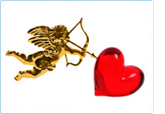 Not everyone using online dating sites is looking for love. Scammers create fake online profiles using photos of other people — even stolen pictures of real military personnel. They profess their love quickly. And they tug at your heartstrings with made-up stories about how they need money — for emergencies, hospital bills, or travel. Why all of the tricks? They’re looking to steal your money.
Not everyone using online dating sites is looking for love. Scammers create fake online profiles using photos of other people — even stolen pictures of real military personnel. They profess their love quickly. And they tug at your heartstrings with made-up stories about how they need money — for emergencies, hospital bills, or travel. Why all of the tricks? They’re looking to steal your money.
As if all that isn’t bad enough, romance scammers are now involving their victims in online bank fraud. Here’s how it works: The scammers set up dating profiles to meet potential victims. After they form a “relationship,” they come up with reasons to ask their love interest to set up a new bank account. The scammers transfer stolen money into the new account, and then tell their victims to wire the money out of the country. Victims think they’re just helping out their soulmate, never realizing they’re aiding and abetting a crime.
Here are some warning signs that an online love interest might be a fake. They ask you to:
- chat off of the dating site immediately, using personal email, text, or phone
- wire money using Western Union or Money Gram
- set up a new bank account
Did you know you can do an image search of your love interest’s photo in your favorite search engine? If you do an image search and the person’s photo appears under several different names, you’re probably dealing with a scammer. And if the person’s online profile disappears a few days after they meet you, that’s another tip-off.
Here’s the real deal: Don’t send money to someone you met online — for any reason. If your online sweetheart asks for money, you can expect it’s a scam.
Unfortunately, online dating scams are all too common. There may be tens of thousands of victims, and only a small fraction report it to the FTC. If this happens to you, please report it at ReportFraud.ftc.gov.


In reply to What do they care about what by BenjaminSoma
In reply to I am pretty sure I am being by Audette address
In reply to Ok, so i am recently Divorced by Not easy
In reply to The only asset my friend has by Concerned Friend
Pagination